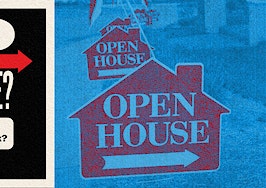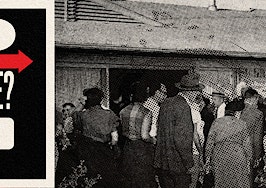This is the fifth article in a five-part series on open houses that will run between Monday, November 11 and Friday, November 15. Read part one here, part two here, part three here and part four here.
Pat Monahan decided to go big or go home.
Monahan, a West USA Realty agent in Arizona, told Inman that last month he had been tasked with selling a home in the city of Chandler. The property was a bit long in the tooth — nothing had been updated in decades — but Monahan decided to try something new: He’d hold a “mega open house.”

A flyer Monahan distributed to thousands of homes. Credit: Pat Monahan
“I hired a company to put out signs for me,” he recalled. “I did 2,000 flyers. We catered the event with a local restaurant. We did some advertising on Facebook.”
Monahan is not actually a fan of open houses generally. Like some other agents today, he sees them as less productive than other forms of prospecting, and not particularly great for actually selling properties. But after reading several books on communication, he thought the open house format might actually work if he turned it into a bigger, more elaborate event.
And work it did.

Pat Monahan
“We probably had four to five dozen people go through the house,” Monahan recalled. “We ended up, in the first six days it was listed, getting five offers. Two of them were buyers who came through the open house. They both came in and said, ‘we have a Realtor but we just found this on the internet. We want to see it.'”
Monahan’s experience captures two distinct trends happening right now among agents who hold open houses. First, technology is a growing resource for both agents and brokerages. From social media advertising to virtual reality to data collection, tech is changing both the audiences and the objectives of open houses.
And second, many agents who spoke to Inman for this story said that they, like Monahan, are shifting toward more lavish and involved events, and away from the comparatively low effort carton-of-grocery-store-cookies approach.
Taken together, these dual trends point to ongoing evolutionary leaps forward in open house practices, which have otherwise been mostly stable for over half a century. Or put another way, the open house of the future may look very different from the open house of the past.
Technology is expanding the meaning of an open house
Probably the most obvious way that technology is already being deployed in open houses is via electronic sign-in software like the kind produced by Spacio, a startup that HomeSpotter acquired earlier this year. Agents and brokerages using Spacio can set up an iPad or laptop at their open houses, which visitors use to sign in.
On the ground, Spacio feels like an obvious, if small, technological leap forward for the open house; consumers see something new and agents get to build a brand around being tech-savvy.

Credit Spacio
But the real transformative capacity of technology like Spacio lies under the hood.
Melissa Kwan — who co-founded Spacio and is now a vice president at HomeSpotter — explained that Spacio takes the names and contact information that people enter at open houses, then scans public data to verify those people as leads. So far, 650,000 consumers have interacted with the software and Spacio has been able to verify 50 percent of them, Kwan said.
Spacio consequently represents the automation of open house-related tasks, such as chasing down everyone who signed in, that agents might have had to perform themselves in the past.

Melissa Kwan
Perhaps even more fundamentally, however, they’re also turning the open house into a method to generate and harness data — which is a major shift in the overall objective of an open house.
“We have brokerages that are trying to get agents to use this because they want to know where they should spend their advertising dollars,” Kwan said, explaining that the software can lead to more data-centric and geographically targeted marketing.
Agents such as Monahan are also using other platforms as well to achieve levels of targeted marketing for their open houses that would have been impossible just a few years ago.
“Social media is a great way to reach the local community,” Monahan said. “On Facebook, you can pinpoint the area where you want to be. They give you a 15 mile radius.”
For other agents, open houses sometimes don’t even happen in the real world.
Miami team leader Nick Quay told Inman that five or six years ago he was the first agent in his region to obtain an Matterport camera. The cameras weren’t yet even publicly available, but after meeting a Matterport executive at an Inman conference, Quay convinced the company to sell him one. Quay now uses the camera to create 3D renderings of listings.
But he also told Inman that he stages “virtual open houses.” He compared the concept to a choose-your-own-adventure book.

Nick Quay
“Each person creates their own experience,” he explained. “Anyone in the world can step into the property at their own convenience. They can see it and they can look at it their own way.”
Quay explained that he is able to invite clients to view the properties, and that he can see how many people are “inside” the virtual open house at any given moment.
Matterport tours can be experienced on any electronic device, and are also supported by portals such as Redfin.
But in Quay’s case, he presents his open houses via virtual reality headsets, which potentially give his clients more immersive experiences. Among other benefits, Quay said this approach allows clients in far flung parts of the world to “attend” open houses even if they can’t immediately visit in person. And that has translated into sales.
“I get a lot of offers sight unseen,” he added.
Quay is still on the cutting edge of this technology, with most other agents who spoke to Inman saying they expect to see such tools deployed in the future but haven’t yet witnessed them firsthand.
However, there does seem to be an appetite for open houses sans actual houses.
In an email, Josh Weisberg — Zillow’s senior director of 3D and computer vision — said that his company’s 2019 trends report revealed that 52 percent of buyers felt 3D home tours would help them understand a space better than photos. Respondents also expressed an interest in virtual staging technology.

Josh Weisberg
In that context, tech-driven advances in the home-touring experience could be on the horizon.
“Listing agents and sellers could provide additional home details about appliances, home upgrades, and even preview alternative paint colors as shoppers move through a house in person or virtually,” Weisberg said.
And while it’s not yet clear how exactly this tech will ultimately change open houses, Quay’s experience of going fully online for his virtual open houses suggests the impacts could be significant.
Agents are gravitating toward “mega” open houses

Michael Repka
Michael Repka has spent as much as $20,000 on open house-like events. Repka, the CEO of DeLeon Realty, works in the pricy and competitive Silicon Valley market and told Inman that he regularly stages elaborate open houses to generate publicity for listings. He has hired jazz musicians and caterers. He has brought in coffee carts. He has employed pizza chefs and bar tenders. At one event, someone was paid to float around in a pool and serve drinks.
“It creates a buzz,” he explained of the strategy. “These events, people will talk about them.”
At one recent event, agents actually even dressed up in Victorian costumes to match the period architecture of the listing.
Repka’s events operate on a scale of “openness,” and highlight the way that some “mega open houses” also have targeted audiences. For example, Repka said that when he was tasked with selling a home built by famed architect Joseph Eichler, he invited “everyone who owned an Eichler home in less expensive areas.”
The idea was that those people were fans of the architecture and might turn into clients interested in trading up.
Some agents have used similar tactics for their broker open houses. John Fortney, an agent with Harvey Kalles Real Estate in Toronto, told Inman that about a year ago he was tasked with selling a high-end condo that happened to have an indoor pool on its second story.
Fortney decided to lean into the pool, figuratively speaking.

John Fortney with a mermaid at a broker open house. Credit: John Fortney
“I had a mermaid swimming around for two and a half hours,” Fortney recalled.
Guests at the event ate it up, sharing photos on Instagram and telling other people about the listings.
“It went viral, it went crazy,” Fortney said. “From that point, it was incredible exposure.”
Though the open house with the mermaid was a particularly noteworthy case, Fortney said that there are real advantages to his practice of generally throwing big, flashy events.
“If you do it right you can make a name for yourself,” he explained while recalling another broker open house for which he hired a professional pianist.

Another one of Fortney’s broker open houses, for which he hired a pianist. Credit: John Fortney
Other agents are merging the concept of the mega open house with advances in technology. Quay — who is not actually a fan of conventional open houses — said that when he holds an actual event in real life, it’s an elaborate affair.
“My open house is more like a block party,” he said. “I throw community events.”
In the past, Quay has effectively turned listings into art galleries, complete with original works for sale on the walls. He has hired jugglers. He has held contests, and in the past some visitors have won tickets to Miami’s exclusive and celebrity-packed Art Basel event.
Significantly, however, visitors to Quay’s events can also experience his virtual reality spaces.
“I have seven or eight VR headsets around my house,” he said. “They’re stepping into my other properties while they’re in my open house. It’s really cool.”
There is no data on how many agents are throwing “mega” open houses verses conventional ones, and it remains to be seen how widespread this approach will become; the agents who spoke to Inman for this story, after all, don’t hold these events — which are both time-consuming and expensive — for every listing.
However, both they and the agents who spoke to Inman for other parts of this series agreed that the market and consumers are changing. The good news is that everyone agreed that, even with new technologies, agents still have an important role to play. But it also means that when it comes to marketing practices like open houses, they’ll have to be savvier in the future.
“I think the future is that we have to bring marketing expertise to our clients,” Monahan concluded. “That’s our main job, and if we do that well people are going to want to make an offer on the home. If we don’t, then they can have anybody, a robot, list their home and get it sold.”













